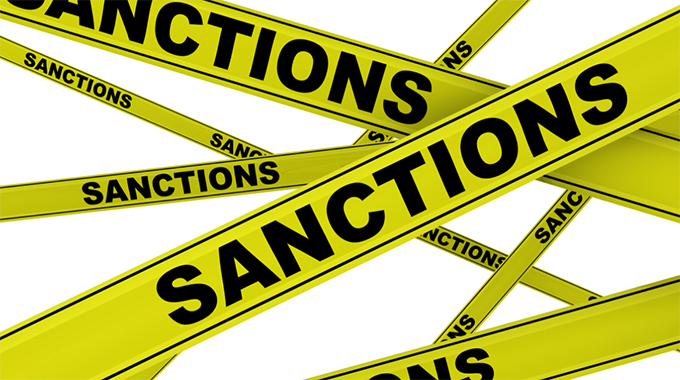Editorial Comment: Sanctions on Zim not justified

There is no justification for the continued existence of sanctions by the US, Britain and its allies in the European Union (EU) on Zimbabwe.
And, there was no justification in the first place.
Again, they were illegally imposed because they did not have the blessing of the United Nations (UN).
All the sanctions have done for the past two decades is to cause the suffering of innocent people.
Sanctions have now come to be abused as a tool to subject weaker nations to the whims of powerful countries.
We are all seeing the pain and misery brought by sanctions imposed by the US on Zimbabwe, Iran, North Korea and Cuba, among others.
Sanctions are now in danger of being used too much and abused like emergency numbers.
Sanctions have hit Zimbabwe hard in all sectors.
They have massively hit our manufacturing, commodities, agriculture, trade and finance and, social services with consequences for all aspects of ordinary life.
The economy has tanked several times, with our currency falling and prices of basic goods and services rising beyond the reach of the majority of the poor.
Sanctions have severely penalised Zimbabwean companies and isolated the country from the international financial landing institutions.
There is no doubt that the sanctions struck and paralysed the heart of our Government’s ability to function and deliver service to its people.
Under the sanctions, the percentage of Zimbabwean families living in poverty has more than doubled, with millions left without access to essential medical treatment and drugs, while school dropout figures have risen as struggling families pulled their children out of school to alleviate extreme financial hardships.
Sanctions that seem unrelated to innocent civilians often have unforeseen consequences, like the deaths that have resulted from poor access to drugs and equipment for treatment, accidents on roads and other critical areas since the country’s isolation from the international community began to limit access to spare parts and vital industrial components.
The moral argument for sanctions is a tough one.
For them to have any chance of achieving their aim, which is usually regime change, they will inevitably result in the widespread suffering of ordinary people.
Sanctions are justified when there is global consent on a particular issue. Take apartheid South Africa, the moral desolation of which needs no elaboration.
It should be a source of shame for both the US and the UK that stood alone in the Security Council well into the 1980s, opposing sanctions on apartheid.
In the UK’s case, the then Foreign Secretary John Major memorably claimed that sanctions would only “feed white consciences outside South Africa, not black bellies within it.”
Progressive voices within South Africa and those in exile, especially those in the incredibly effective international coalition of anti-apartheid campaigners, not only wanted, but actively lobbied for sanctions.
There was consensus on sanctions against apartheid South Africa. On Zimbabwe, there is no consensus.
Africa, Asia and most other countries in Latin America are opposed to the sanctions.
There is simply no justification for the continued existence of sanctions.
If the objective is the empowerment of the civilian population, what has the US done to listen to the authentic judgments of those who represent them?
It hasn’t done this because these sanctions are more about US interests than they are about improving the lives of ordinary Zimbabweans.
This hardly comes as a surprise, but it could well fail on its own logic.
While the US is alienating the Zimbabwean people who are bearing the brunt of the widespread hardships and economic turmoil — all the signs are that our Government will survive given the support and solidarity of China, Russia, Africa and more importantly SADC.
Sanctions will exactly achieve the opposite of what the US wants.
Sanctions cannot be justified if it’s already apparent that they won’t work.
Causing destitution among the people of Zimbabwe rarely makes the world a better place.
Sanctions are a form of violence, which means that, as with other uses of force on the world stage, there should be a high bar to justify their imposition.
The US, UK and their allies should be certain of their practical efficacy and confident that the civilian price that will be paid is morally justified.
For Zimbabwe, it’s hard to see how the US sanctions pass either test.
Today’s demonstration against sanctions is to exert moral pressure on the US, Britain and their allies to lift the sanctions.
We are quite aware that ZIDERA will not be revoked today or any time soon.
Those with good memory amongst ourselves still remember how moral pressure worked against apartheid South Africa.
It piled pressure and led to the end of apartheid.
The biggest shame in Zimbabwe is the opposition political outfits and opponents of our Government who are not seeing the bigger picture and objective of the anti-sanctions demonstration.
They are peddling lies and selling our struggle for economic sovereignty for the dime.
There is no sane person who can support sanctions on their nation.
It’s a mockery of the suffering of our people.
Sanctions are counterproductive and will not help solve the pressing problems in Zimbabwe.
If anything, lifting them will help bring Zimbabwe back to the family of nations and put it firmly on the path to recovery and growth.










Comments